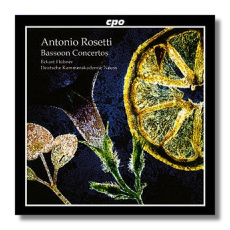
The Internet's Premier Classical Music Source
Related Links
- Rosetti Reviews
- Latest Reviews
- More Reviews
-
By Composer
-
Collections
DVD & Blu-ray
Books
Concert Reviews
Articles/Interviews
Software
Audio
Search Amazon
Recommended Links
Site News
 CD Review
CD Review
Antonio Rosetti

Concertos for Bassoon
- Bassoon Concerto, Murray C74/Kaul III:62
- Bassoon Concerto in F Major, Murray C75/Kaul III:63
- Bassoon Concerto, Murray C73/Kaul III:61
- Bassoon Concerto, Murray C69/Kaul III:60
Eckart Hübner, bassoon
Deutsche Kammerakademie Neuss
CPO 999936-2 DDD 65:04
A successful contemporary of Mozart, Antonio Rosetti (c. 1750 -1792) is largely forgotten today. Those who wish to learn more about him have their work cut out for them; there isn't even agreement as to how his name should be given. He is believed to have been born in the region of Bohemia, and his name is somtimes erroneously given as Franz Anton (or František Antonín) Rössler (or Rösler). He was appointed to the court orchestra of a Prince Kraft Ernst zu Oettingen-Wallerstein, first as a bassoonist, and eventually as its music director, a post he held until 1789. Rosetti's success gave him the opportunity to travel, notably to Paris, where he remained for more than six months as a performer, composer, and eager observer of all that that city had to offer, musical and otherwise.
CPO claims world première status for these recordings. Rosetti wrote six surviving bassoon concertos, and four of the six appear here. In some cases, it is not known what occasioned their composition, but several of them appear to have been written for Christoph Ludwig Hoppius, who joined the Prince's orchestra in 1783, and who remained there throughout the balance of Rosetti's tenure. In any event, these four concertos probably were written in the 1780s. This makes them slightly younger works than Mozart's famous Bassoon Concerto, which was written in 1774.
It has been said that Rosetti's music lacks a distinctive style. On the basis of these concertos, I have to agree. They are completely within the tradition of Haydn and Mozart at their least innovative. That's not to say that this is bad music, however. In fact, it is expertly written, attractive, and complimentary to the soloist. (It should be noted there are alternative versions of at least one of these works for clarinet and flute.) Rosetti's bassoon concertos make you feel that everything is ok, if not in the whole world, then at least in your own particular princedom.
Eckhart Hübner trained with the famous German bassoonist Klaus Thunemann, and he has played with a variety of orchestras, including the SWR Symphony Orchestra. Chamber music and teaching also occupy his time. This is his first recording as both soloist and conductor, and everything goes well, although the engineers have balanced him too prominently. The German Chamber Academy of Neuss on the Rhine is about twenty-five years old, and its musicians accompany Hübner suavely.
This isn't terribly important music, but it goes down smoothly like a cool glass of Rhenish wine.
Copyright © 2003, Raymond Tuttle



















